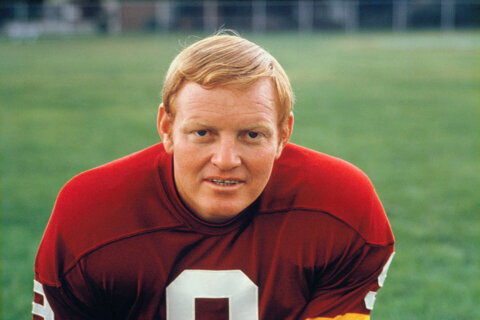WASHINGTON — You can argue about whether “Bull Durham” is a romantic comedy set in front of a minor league baseball backdrop or a baseball movie with a love story. But at its core, it’s a movie about that second stage of growing up, not from child to adult, but from 20-something to 30-something.
As the seminal classic turns 30 this month, it’s worth appreciating a film that has held up better than many of its contemporaries and still has plenty to teach us about baseball and life.
While the film pivots around a love triangle featuring both wily, veteran catcher Crash Davis (Kevin Costner) and unrefined fireballer Ebby Calvin “Nuke” LaLoosh (Tim Robbins), the strongest, wisest character at its center is its female protagonist, Annie Savoy (Susan Sarandon). It’s Annie’s voice we hear first, as she opens the film with the iconic line “I believe in the church of baseball,” and the sound of the stadium organ bursting through before she can round out her last syllable. But there are other bits in her opening monologue that are more instructive of the film’s soul.
“I’ve tried all of the major religions and most of the minor ones … I know things … You see, there’s a certain amount of life wisdom I give these boys. I can expand their minds.”
Hers is a voice of experience, someone who knows the pitfalls and pratfalls of young adulthood and how to steer around them. Your twenties are a decade filled with trial and error, overcrowded days and nights of everything, all of the time. They require a certain undeserved brashness to get through them sometimes, what Crash Davis would call “fear and arrogance.”
As a young, talent-laden baseball player like Nuke LaLoosh, the baseball life is everything. He is defined by the success and status it has brought him — the big contract, the attention, the Porche 911 with the quadraphonic Blaupunkt. Off the field, he is only worried about the next time he’ll get laid.
Or, as Annie puts it: “The world is made for people who aren’t cursed with self-awareness.”
Nuke needs a nickname, needs to tell everyone to start using it. Crash’s nickname is so ingrained, so ubiquitous, that everybody knows it already, even Max Patkin, the Clown Prince of Baseball. In fact, we never even get the explanation of where it came from, never even learn his real name.
For Crash, a dozen years of minor league grind behind him, the game — and his access to it — looks much different.
“You can keep going to the ballpark and keep getting paid to do it,” his manager tells him upon arriving back in A ball after his Triple-A contract gets bought out so he can mentor Nuke.
That’s it. That’s as much as is promised, and even then, only for a certain period of time. There is no particular fame or glory awaiting, no pinnacle of the sport, no immortality. There’s just baseball, and a judgment of whether it’s still worth it to show up every day to play.
The screenplay was penned by Ron Shelton, who also wrote “White Men Can’t Jump,” “Blue Chips” and “Tin Cup.” And while those other films prove his acumen for telling a good story through the prism of sports, his own background as a minor league baseball player shines through in the details of “Bull Durham.” Every bit of goofiness from the minors — the non-stinky pain relieving cream being on back-order, the “Hit Bull, Win Steak” promo, the crack of the wooden mallet and fake crowd noise for the road broadcast — to the challenges of long bus rides, slumps, and losing streaks, it all makes the film such an excellent portrayal of the daily joy and anguish of the game.
As fans, as we grow older our own appreciation and enjoyment of baseball becomes less married to the singular glory of championships and more intertwined in that day-to-day experience; more about the respite of being at the ballpark; more about the joy the game inspires in the next generation.
“Young men are uncomplicated,” Annie tells us, and though she is speaking in terms of relationships, she may as well be talking about how we view sports. The older we get, the more complicated our relationships with teams become, as we start to understand service time, and stadium bonds, and just how criminally underpaid minor leaguers truly are. But we also find joy in the endless thirst for more knowledge of how the game works, appreciating its constant shifts in strategy and approach — the quantum physics of it all.
That’s the spirit that animates “Bull Durham,” one of gratitude for the finer points of our most lasting American sport. It’s not about the individual achievements, or even team glory. Nuke makes it to the majors, but we never see what happens to him beyond that. Crash breaks the minor league home run record in quiet obscurity and calls it a career. Annie, ever the connoisseur of poetry, finds the right words in a Thomas Gray work fittingly entitled Elegy Written in a Country Churchyard.
“Full many a flower is born to blush unseen, And waste its sweetness on the desert air.”
In the end, Crash quits chasing the glory. Annie quits chasing boys. They both continue to revel in baseball’s quirks and idiosyncrasies, but aren’t unhealthily obsessed with the game, with winning championships, with being recognized as the greatest of all time, as the leads in so many other sports tales are.
That’s not to say Crash (and the film) isn’t romantic about baseball — it certainly is. But there’s no sugarcoating the realities of the game. Hit a slump and the organization will release you. Spend a whole year mentoring and sharpening a young pitching prospect and they’ll send you packing just the same, to make room for some hotshot prospect hitting .300 at Bluefield. The game will chew you up like a sunflower seed, suck every ounce of what it needs from you, then spit out the husk without thinking twice. Yet, still, we return to it.
After all, there might be a managing position open in Visalia next year.







